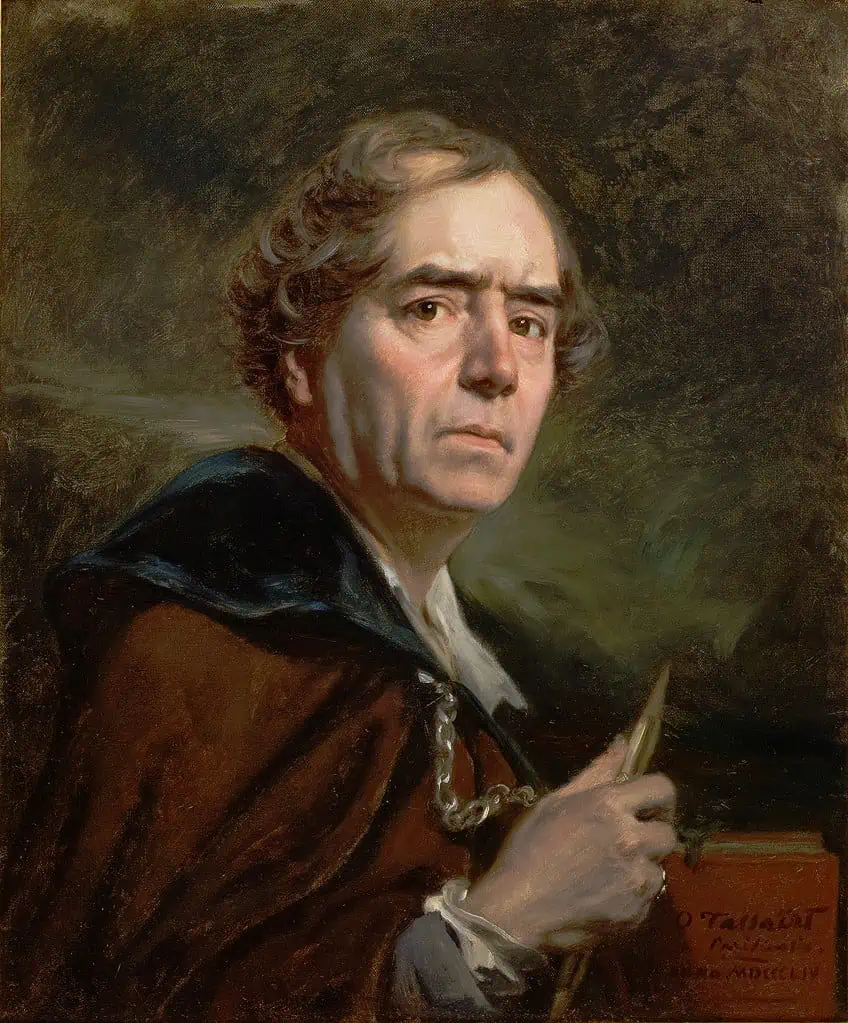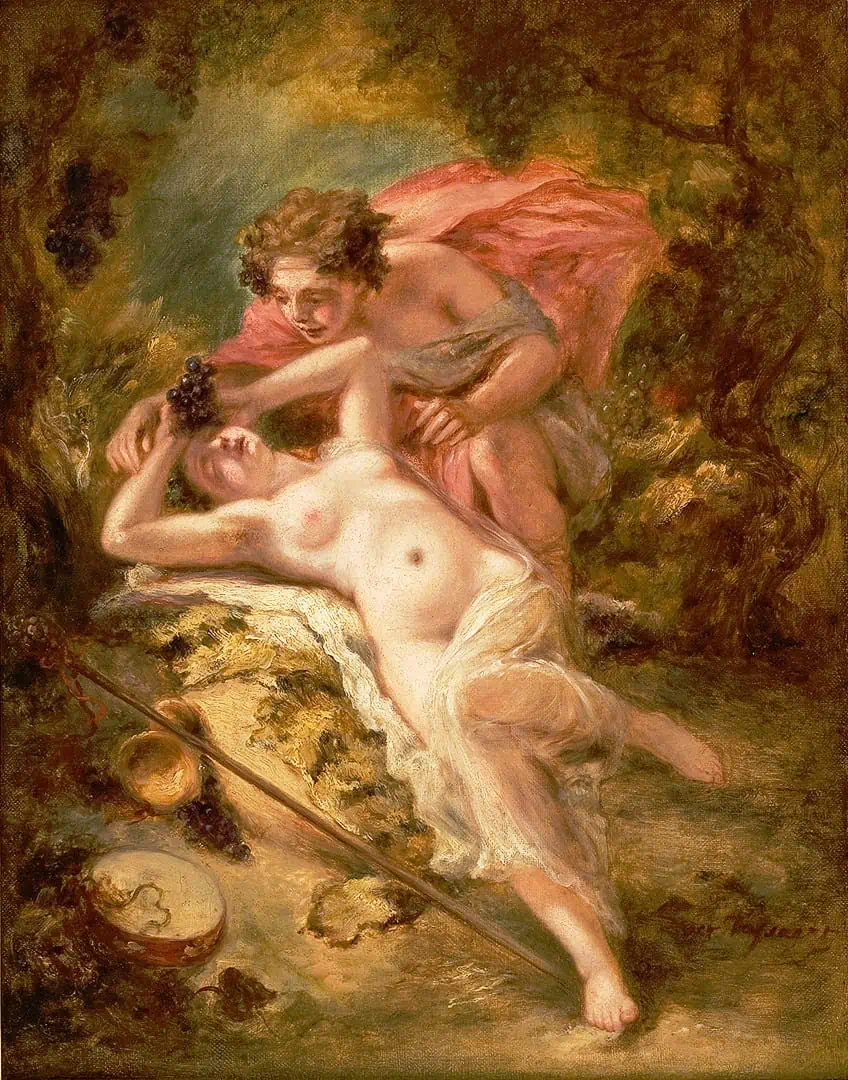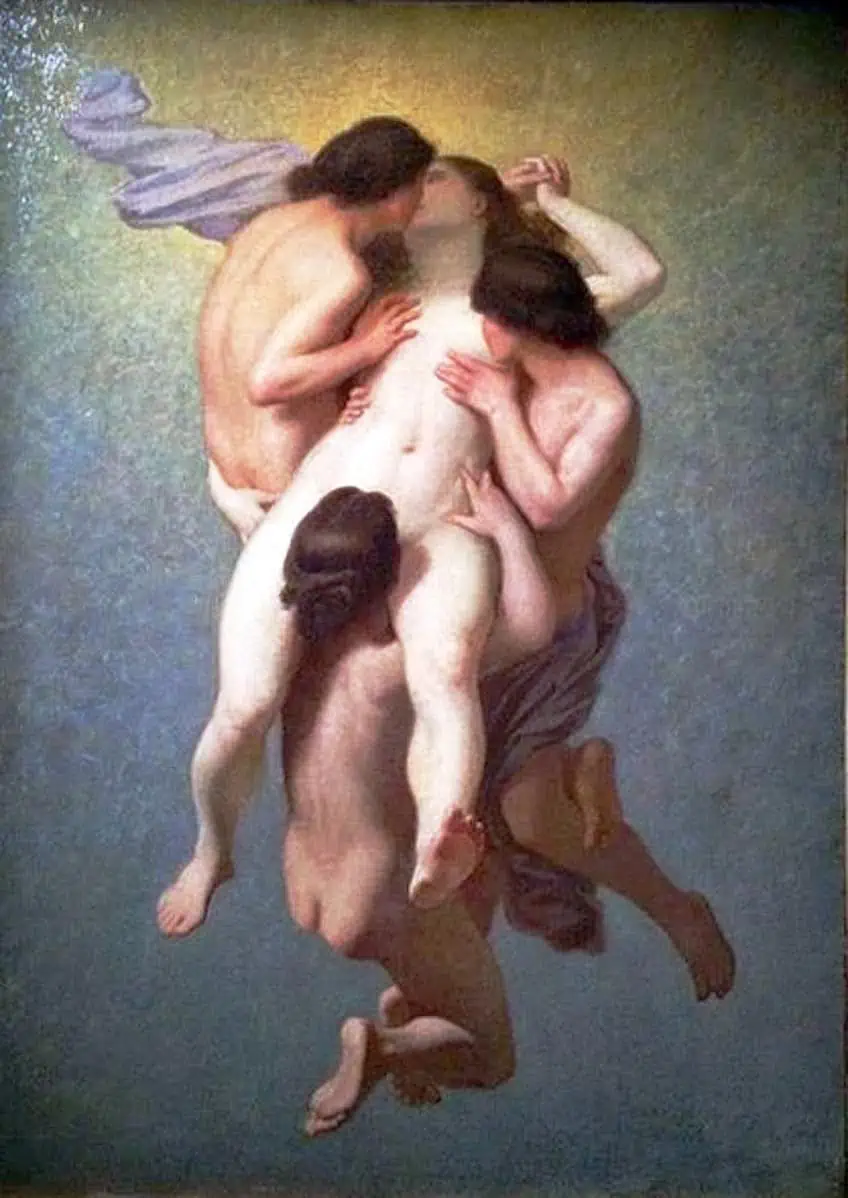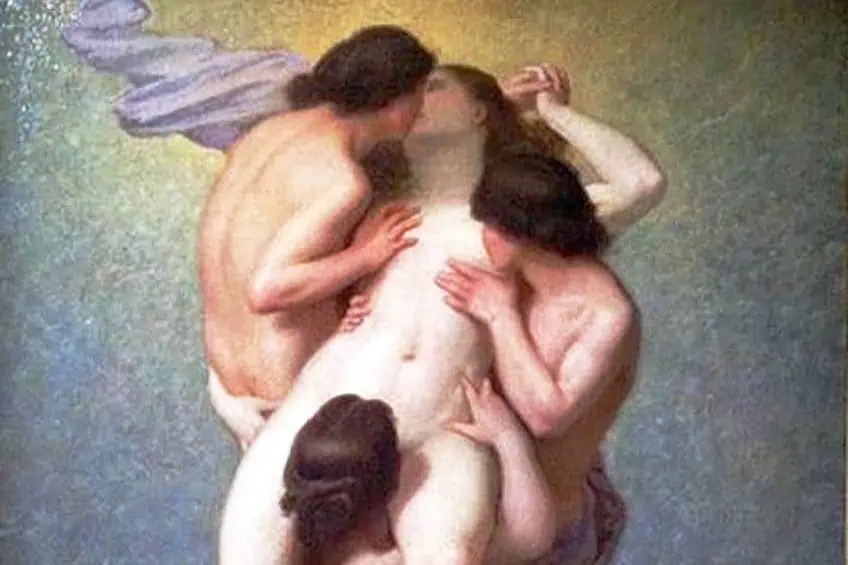“The Cursed Woman” Painting by Octave Tassaert – An Analysis
Many people who look at The Cursed Woman painting by Octave Tassaert find it hard to pinpoint exactly why she is considered cursed. Otherwise known as La Femme Damnée, it portrays three beings intimately seducing a woman. But, what is The Cursed Woman by Tassaert’s meaning? Let us find out below, as we unravel The Cursed Woman (1859) story.
Understanding The Cursed Woman Painting by Octave Tassaert
| Artist | Octave Tassaert (1800 – 1874) |
| Date Completed | 1859 |
| Medium | Oil on canvas |
| Dimensions (cm) | Not stated |
| Location | Not stated |
Why was the woman in this painting regarded as damned by its artist? Did he feel that any woman who enjoyed sexual pleasures was really damned or cursed, or was he trying to make some kind of political statement about how just being a woman makes you damned in the eyes of society?
The truth is, there is very little to no information on this painting. No one seems to know anything other than the date it was created or where it currently resides.

Yet, it has recently become something of a meme due to the apparent contradiction between the title of the artwork and the seemingly uncursed activity that she seems to rather be enjoying. There is a little bit of information about the artist himself, so let us start there. Perhaps we can learn more about the era in which it was produced and why a woman in this scenario would have been regarded as damned or cursed, instead of just lucky, or expressing her sexual freedom.
An Introduction to Octave Tasseart
Nicolas Tassaert, a French artist, was also regarded as something of a social justice activist. His grandfather was a sculptor, and his father and elder brother were his initial artistic mentors. He later attended an art school from 1817 until 1825, where he received recognition but did not achieve critical acknowledgment. In the majority of his works, he made money while depicting the realities of a dysfunctional, destitute, and diseased society.
With his art, he also investigated a more sensual aspect. His paintings portrayed passion, seduction, and sheer sexual pleasure.

At some point in his career, Tassaert stopped entering his works into exhibits and subsequently quit painting entirely. He attempted to become a poet and eventually sold all of his surviving artworks to a dealer. His downfall was that he became an alcoholic, which caused his eyesight to deteriorate, and in 1874, he took his own life in his Parisian house, dying from the inhalation of coal gas.
Some believe it was because he did not get the success he desired and his artistic endeavors were repeatedly dismissed by society.
The Cursed Woman (1859) Story
Octave Tassaert was noted for representing events from religion, history, and allegory in his artworks. Perhaps this is why many have suggested that maybe the woman in the painting is the Greek goddess Aphrodite, and the figures around her are nymphs or angels. The interesting thing about the figures that are seducing the main female character is that their gender is rather hard to discern. Their bodies seem soft and supple and feminine in form. During the 1800s in France, nudity was often depicted in mythical or historical artwork, although often more appropriately as Greek goddesses or gods such as Aphrodite.
However, such an explicitly sexual representation would most likely have caused quite an uproar in its time. In fact, it is quite certain that it did evoke a strongly negative reaction, as it is said to be the artwork that brought his career to a sudden halt.

Yet, it is hard to determine what his motivations were for creating the piece. He was known for his messages about society in his works and had created other erotic-looking works before with a strong social commentary to them, such as The Cautious Lover, which shows a woman blowing up a reusable condom to make sure it wasn’t broken.
This painting had an underlying message about the practice of safe sex, and perhaps La Femme Damnée was similarly made as a social commentary that’s meaning has been lost to time.
The Cursed Woman by Tassaert’s Meaning
While we do not know what the artist’s intentions were when he created the painting, this has not stopped people from trying to analyze and interest its meaning. For many women, they view the painting as a symbol of how women have had to struggle to win the same rights as men.
If a man was in the same position, he would have been seen as fortunate. Yet, a woman in the same position must somehow be damned.
Women have had to fight for their right to enjoy everything without feeling a sense of guilt due to this outdated mode of thinking – whether financial success or enjoying an orgasm without negative feelings associated. Seeing that the artist was something of a social warrior in his time, he could very well have meant for that to be its message, and perhaps why it was so disliked at the time of its creation.
At the time that The Cursed Woman painting by Octave Tassaert came out, women did not enjoy all the same freedoms as men. Even pleasure was something that women were made to feel bad about. Very religious people will view anybody who enjoys carnal pleasures as sinful, and therefore damned. While the painting may have been severely disliked in its own time, the subject matter and title of the painting have found relevance once again in the online meme culture, bringing into question the concepts of femininity, sexual autonomy, and sex viewed as being sinful.
Frequently Asked Questions
What Is The Cursed Woman (1859) Story?
In this painting, we can see a naked woman being sexually pleasured by three beings. Many people fail to see why she is considered cursed, which brings into question how women’s sexuality was viewed in the past. Not much is known about the artwork except that it apparently ended the artist’s career.
What Is The Cursed Woman by Tasseart’s Meaning?
No one knows what the artist, Octave Tassaert’s, intentions were when he originally made this painting. He could have really felt that women’s sexuality was a curse, or he could have been making a social commentary with the painting. Whatever his intentions, nowadays it is perceived as symbolizing how women’s sexuality and freedoms were demonized in the past.
Jordan Anthony is a Cape Town-based film photographer, curator, and arts writer. She holds a Bachelor of Art in Fine Arts from the University of the Witwatersrand, Johannesburg, where she explored themes like healing, identity, dreams, and intuitive creation in her Contemporary art practice. Jordan has collaborated with various local art institutions, including the KZNSA Gallery in Durban, the Turbine Art Fair, and the Wits Art Museum. Her photography focuses on abstract color manipulations, portraiture, candid shots, and urban landscapes. She’s intrigued by philosophy, memory, and esotericism, drawing inspiration from Surrealism, Fluxus, and ancient civilizations, as well as childhood influences and found objects. Jordan is working for artfilemagazine since 2022 and writes blog posts about art history and photography.
Learn more about Jordan Anthony and about us.
Cite this Article
Jordan, Anthony, ““The Cursed Woman” Painting by Octave Tassaert – An Analysis.” artfilemagazine – Your Online Art Source. June 23, 2023. URL: https://artfilemagazine.com/the-cursed-woman-painting-by-octave-tassaert/
Anthony, J. (2023, 23 June). “The Cursed Woman” Painting by Octave Tassaert – An Analysis. artfilemagazine – Your Online Art Source. https://artfilemagazine.com/the-cursed-woman-painting-by-octave-tassaert/
Anthony, Jordan. ““The Cursed Woman” Painting by Octave Tassaert – An Analysis.” artfilemagazine – Your Online Art Source, June 23, 2023. https://artfilemagazine.com/the-cursed-woman-painting-by-octave-tassaert/.




Good write-up. Nice analysis.
Thank you for your positive Feedback Harry!